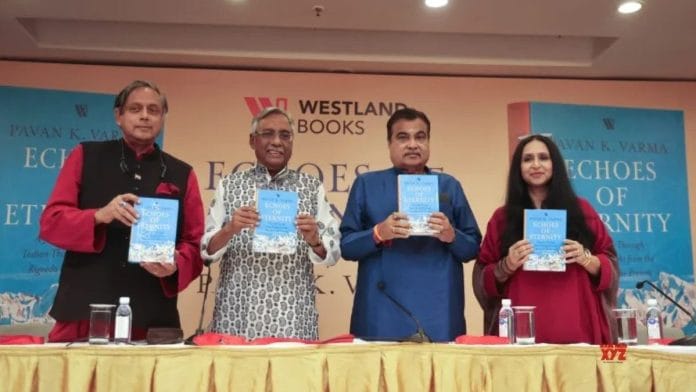New Delhi: Associating Hinduism with casteism or Islam with terrorism is a distortion of India’s philosophical traditions, Union Minister Nitin Gadkari said on Tuesday. He was speaking at the launch of former diplomat and Rajya Sabha MP Pavan K Varma’s book, Echoes of Eternity.
“This is not Hindutva. That is not Hindu Dharma,” he said, calling for a rejection of both jyatiyata (casteism) and rashtra-shyata (extreme nationalism) in public life.
The event at New Delhi’s India International Centre offered political leaders a chance to weigh in on the communal tension in parts of India in the wake of the Pahalgam terror attack.
Gadkari reiterated that misinterpretation of faith—across communities—have taken root over thousands of years, but are not part of India’s original civilisational ethos.
“Just because a person from a community commits a mistake, it doesn’t mean the entire community supports terrorism. Not every Muslim wants violence,” said Gadkari, Union Minister for Road Transport and Highways.
The more than 150 guests, including scholars, bureaucrats, and journalists, were part of a thoughtful exchange between politicians who are typically on opposing ends of the political spectrum. Congress MP Shashi Tharoor spoke about India’s civilisational strength, but also criticised the absence of South India in the book.
“As someone raised in the South, I couldn’t help but notice a distinctly north Indian bias in the selection. Thinkers like Sri Narayana Guru, Basavanna, Subramania Bharati—towering figures in our civilisational legacy—are missing, and that absence matters,” said Tharoor.
Also read: Pakistanis queuing at Wagah curse terrorists. ‘They don’t fight wars, they destroy families’
Defining Indianness
Gadkari spoke for 20 minutes about Indian philosophy, Hinduism and the true meaning of Dharm. Hindu thought was never rigid, but an evolving system rooted in duty, inquiry, and compassion, he said.
“Dharma means duty—not ritual.”
He added that Indian civilisation has always embraced multiple streams of thought, from the non-violence of Buddha to the Advaita of Adi Shankaracharya. He praised Varma’s effort for “bringing together the wisdom of centuries” and presenting it “not as a religious dogma, but as a civilisational legacy that belongs to all.”
“From the Rig Veda to Buddha’s compassion, Adi Shankaracharya’s Advaita to the ethical teachings of Mahabharata, Pavanji has studied them all with depth and presented them in clear, thoughtful language. On such a complex subject, he has brought together Indian philosophy, spirituality, and culture—not just as history, but as a guide for the future,” said Gadkari.
Echoes of Eternity: A Journey Through Indian Thought From The Rigveda To Present published by Westland Books, is an anthology of ancient Indian texts and philosophies as well as current discussions on what defines ‘Indianness’.
“There was no fear, no prescriptive direction, not even a commandment for divinity. The six systems of Hindu philosophy can technically be called atheists — their search was not for God, but for the ultimate truth behind the plurality of the cosmos,” said Varma.
Also read: Agra Muslim victim’s cousin recognised the killer in gau rakshak video, called police
Everyone has sanskar
But Tharoor, with his characteristic wit, pointed out how ancient Indian texts are often misinterpreted or oversimplified, especially in the popular imagination.
“The selection from the Kama Sutra, I’m afraid, is entirely untitillating—as, frankly, most of that book is. People often focus on the illustrations, but Vatsyayana was really just fond of making lists,” he said.
As the conversation shifted to Indian culture and the perceived threats to it, the evolution of love and marriage also came up. According to Gadkari, live-in culture in India is not as widespread because “everyone in India has sanskar”, rich and poor. They don’t support such trends, he said.
Varma laid the case for an Indian philosophy marked by openness, plurality, and intellectual freedom. He expanded on the importance of culture and how it should be authentic.
“Nations which are culturally ruthless are unlikely to be authentic great powers. I often say, nobody respects photocopies — you have to be yourself, without chauvinism or xenophobia. And for that, you must know something about your culture,” said Varma.
(Edited by Theres Sudeep)






